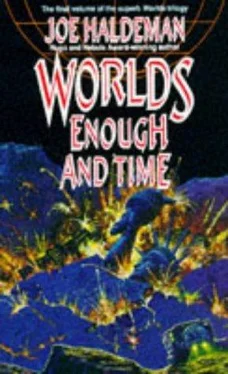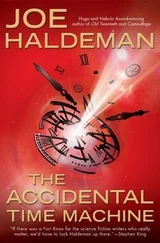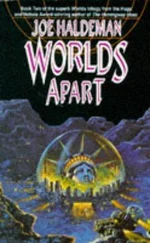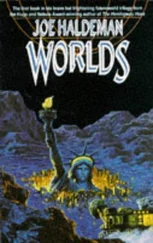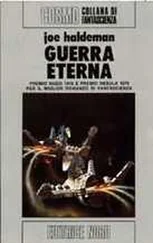“Damn right,” he whispered. “Her and you and me and everybody.” He drained his wine and slid O’Hara’s cup over.
O’Hara spent a few minutes sitting in a stall at the nearest toilet, until she was sure dinner would stay put. Then she went down to the humid darkness of the ag level and walked a maze of exactly this many steps and turns right and left, which she’d memorized in the daytime. The path led to a bench beside a tank of herbs, where you could sit blindly bathed in fragrances of basil and oregano, thyme and marjoram. She filled her lungs over and over, until she saw blue blotches and sparkles in the darkness. Then she gave herself a quiet orgasm, remembering Jeff’s largeness, remembering New Orleans.
Stale cigarette smoke and spilled beer, and she with a clarinet reed softening on her tongue, heart slamming at the prospect of exposing her inexpertise to this crowd of laughing black men, some women, manic drunk, shouting stylized insults back and forth. Fat Charlie’s. Scales and intervals, warming up in the kitchen, the ice-cold stab of sour-mash bourbon, then Charlie’s pistol-shot finger snaps and the crowd loving it, loving it, formal backups and improvisations in turn, the soft sweet thirds and fifths under Bad Tom’s cornet, trading jazz jokes with Jimmy on the banjo, Hairball on the piano, and between sets rubbing the sides of her mouth desperately to ease the cramps, holding crushed ice under the bruised bitten lips and swallowing salt, blood with sweet mint and cold bourbon, knowing it could never happen again. Not knowing that in four days all those sweet and sinning men would be dead, New Orleans a radioactive crater, the Mississippi seeking the stratosphere in a column of superheated steam.
There were only three other people aboard this starship who had been on Earth the last week, she knew, the week that Earth’s politics became an irrational beast, lunging out of control, and there was no one else who was there the last day, no one but her who had been on one of the last four shuttles that leaped into the morning Florida sky just before the nuclear paroxysm.
And if there was no one left alive in New New, then she was probably the only living human link to the day the world ended. It was not a distinction you wanted to carry to the new world; she could imagine what an object of curiosity and pity she would be in a couple of generations. What a gold mine of information for graduate degrees, if they were still doing that. Or perhaps she could start a religion.
Seriously, she thought, it would be a good idea to get together with the other three survivors of that time. They’re probably having problems, too.
They were. She went back to her office and tried to contact them. One refused to speak to her. One was confined to the mental ward. The third had committed suicide a day after they lost New New.
She took a tranquilizer and went up to John’s room to try to sleep.
The womb was a dark glass cylinder named O’Hara, a meter high by a half-meter round. There were a hundred such cylinders in the room, most of them with nameplates. All but a few were evidently empty, their tops hinged open.
All of the family were there, scrubbed down and wearing hospital gowns. O’Hara nervously glanced at her wrist, but she’d had to leave her watch in the scrub room. “He ought to be here by now.”
“It’s not as big an occasion to him,” Dan said.
Double doors banged open and Dr. Kaiser came in with a young male assistant, wheeling a cart with a large transparent tank filled with sloshing liquid. They both wore plastic aprons. “Sorry we’re late. The solution wasn’t warm enough.”
They parked the tank under the O’Hara womb. “Take a look.” He clicked a switch on the cylinder and the baby appeared, floating serenely in red murk. “Enjoy yourself, kid. It’s later than you think.” He reached for the switch.
“Just a minute,” O’Hara said. “I want to remember this.” The baby was smaller than she’d expected. She floated upright, small fist curled against her mouth, knees up almost touching elbows. Short halo of feathery hair. Between her knees snaked a plastic umbilical cord. Her right side twitched slightly and she bobbed in the fluid, turning around to face them.
“Look familiar?” John said.
O’Hara laughed. “I knew she… it’s still uncanny. She looks exactly like me at birth.”
“All babies look alike,” Dan said.
“She ought to be a perfect copy of your younger self for a few years,” the doctor said, “barring extreme differences in nutrition. Or scars, tattoos. But as her personality develops, she’ll diverge.”
“She looks so peaceful,” Evy said slowly. “It’s almost a shame.”
“Let’s do it.” Dr. Kaiser turned off the switch, then he and the assistant carefully lifted the womb and rotated it to lie sideways on the bottom of the water tank, wires and tubes trailing. He opened a couple of latches and the top swung open. He pulled out a sac of transparent tissue or plastic with the baby inside, then took a pair of curved scissors and cut the sac down one side, releasing a pink cloud. He guided the baby gently out, drawing the umbilical tube after it.
“This may be disturbing. When I withdraw the umbilical it generates a neural stimulus that triggers the breathing reflex. Sometimes they just cough politely and start to breathe. Usually they raise holy hell. Towels ready.” The assistant opened a box on the side of the cart and a wisp of steam escaped. He took out a folded towel and snapped it open.
The doctor raised the baby so that her head and shoulders were out of the water, and then gave the umbilical tube a twist and a pull. Her eyes snapped open, startling blue, and she coughed a surprising amount of pink stuff all over the doctor’s chest and face. Then she started bellowing.
“Normal.” He handed the baby to the assistant, who wrapped her up in the warm towel and began dabbing at her, drying. There was a moment of silence, but that was just for air. “I could use one of those, too,” the doctor shouted over the din. The assistant deftly tossed him a towel and he scrubbed his face with it.
The room spoke with a female voice. “Birth at 09:48 12 August 2099; 21 Muhammed 295. Birth name Sandra Purcell O’Hara.”
“I didn’t know about the metal belly button,” O’Hara said.
“New thing. Makes the unplugging easier. It’ll come out in a couple of days.” He tossed the towel into a bin.
“Can I hold… Sandra?”
“Promise not to drop her.” He nodded at the assistant, who wrapped the baby in a fresh towel and brought her around to O’Hara. The creature was still screaming indignantly.
O’Hara cradled the child and softly brushed the side of her face. “Now, now. It’s all right.” She held her closer and the crying suddenly stopped, when the waving arm found a breast.
The baby grasped and squirmed around and sucked on the fabric. O’Hara almost did drop her.
“Strong instinct,” the doctor said.
“I’ll say.” She cleared her throat. “Could you induce, uh, lactation? If it was—”
“Physically, it would be no problem, just some hormones. But we can’t let the infant bond to you. It would make things difficult in the creche. It would make things difficult for you .”
“Of course. I know.”
“Better get her to Neonatal,” the assistant said. O’Hara handed him the baby and he swaddled her in another warm towel. She favored O’Hara with a sour old man’s frown, but didn’t cry.
O’Hara watched them take her through the double doors and rubbed the wet spot on her breast, thoughtful.
“Maternal instincts?” John said.
Читать дальше
